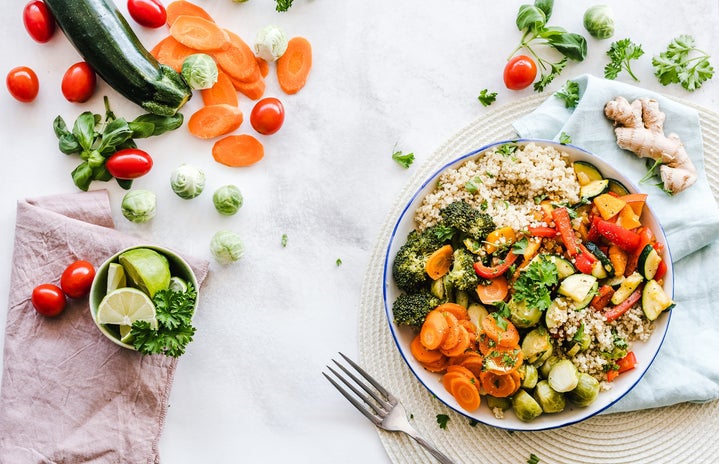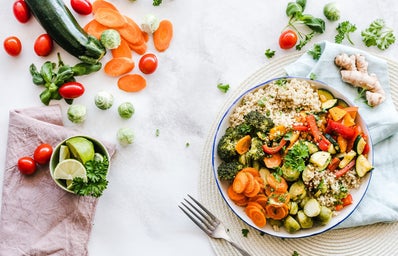When it comes to voluntary dietary restrictions, one can go through many ups and downs. Criticism for your choices, people mixing up the names of different diets, foods you can’t eat ‘shoved’ in your face, and many, many, many ridiculous questions. I was lucky enough to have parents who supported my decision, even if they didn’t understand. I was never forced to eat something if I didn’t want to. Of course, there are good things also. It opens up your world to trying new things, creating new recipes, and a unique understanding of food. Even after ten years, I have remained (for the most part) faithful to vegetarianism, with a few accidental hiccups along the way. Here are some things I’ve learned:
- Some people will be really rude about your choices.
This is probably the first thing I learned, and honestly, I no longer take any offense to it. I remember after I told everyone I no longer would eat meat. Teachers, peers, and even my family couldn’t understand why I would decide to change the way. Even though in reality, it is something that didn’t hurt others, many took offense to the fact I didn’t want to eat meat. Maybe it was because of where we were; growing up in rural upstate New York meant everyone either hunted or lived on a farm. Maybe if I hadn’t been exposed to it in the way I was, then I also wouldn’t understand.
- Sometimes you have to eat that sad salad.
Listen, I know it sucks especially when going out. Sometimes you just want a big hearty meal. Still, the place your friends/family chose to go to just doesn’t have any other options other than a sad house salad, or at your worst, a single baked potato (I’m looking at you, Texas Roadhouse). But because this lifestyle is voluntary, you have to make sacrifices sometimes. It’s good to know what you can get beforehand. Learning that I would have to find the menu beforehand and make a game plan helped a lot. Even places that specialize in barbeque will usually have something, so you don’t completely starve, but if the place is one that a majority of the people you are with agree on, just tough it out, seriously. People will only get annoyed if you try to say they can’t eat there just because you can’t. Unless it is for religious reasons.
- The products for you will improve.
I know this subtitle is weird, but I remember when I first changed it ten years ago. There were very few options for substitutes on the market. Maybe a few Morning Star packages, that still had the old recipes. In the ten years since I became a vegetarian, I have seen so many new products get put into mainstream stores. I have seen oat milk become popular, dino-nuggets make a vegan version, and the invention of impossible burgers. Even though now I don’t find myself wanting any of these substitutes, if I had these options years ago I would have loved it. Although I do still love using fake breaded chicken when making curries.
- You will learn to love cooking.
After I became a vegetarian, even though my parents never really fought me about my decisions, they did make it clear that I would need to be the one in charge of my food if I chose to do this. Since then I have tried so many recipes. Some were great, and some were not so great. The greatest was probably learning how to make curry, really any type, but especially learning how to make a Japanese style of curry vegetarian.
I never hated vegetables, in fact even before I was a vegetarian I absolutely loved vegetables/fruits and preferred them to any type of meat. Although if I were to be completely accurate, bread and pasta are probably above everything. I just can’t resist a good bagel & cream cheese sandwich. Nonetheless, I learned how to cook from an early age, which is honestly a skill everyone should have. It’s important to experiment and learn what you like and don’t like.
- Your reasons will change.
Although I learned about vegetarianism and veganism a long time ago, through various YouTube channels or general influencers who lived the LA vegan lifestyle, my reasons for keeping the diet have changed. This isn’t a bad thing. Although my personal views about animal rights activism and what is considered a “moral” way of eating have changed, I still haven’t given up the lifestyle. Although I still believe that people should be conscious of where their food comes from and how much they consume, nobody is bad for wanting to consume meat. Especially when they eat their traditional foods, or don’t have the funds to willingly be able to have this lifestyle. It’s not a lifestyle meant for everyone, and that’s okay.
Overall, I think becoming a vegetarian at such a young age truly shaped who I am now. Being a vegetarian still can be considered very much a staple of who I am when other people think of me. I am proud to say that I willingly chose this lifestyle and that I have kept it for half of my life. It is no small feat. I’m excited to see what changes and lessons will come ten years from now.


